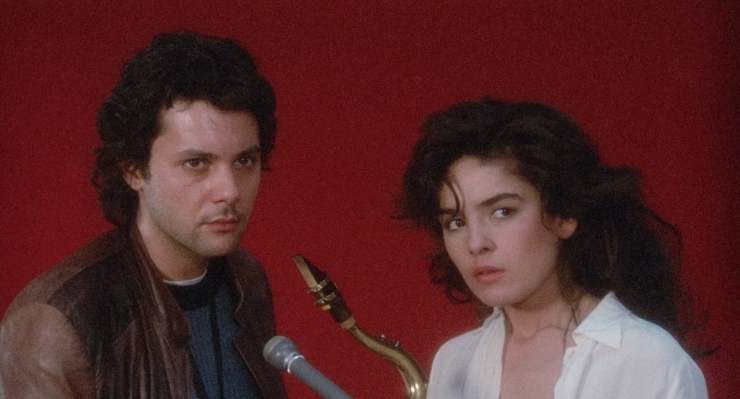Horrors Elsewhere is a recurring column that spotlights a variety of movies from all around the globe, particularly those not from the United States. Fears may not be universal, but one thing is for sure — a scream is understood, always and everywhere.
Lucio Fulci’s fans have differing opinions about the tail end of his career. Some say his better days as a filmmaker were behind him by the 1980s. Then there are those who are more lenient; they take into consideration the number of factors that played into the decline in quality of both Fulci’s final films and Italian cinema in general. A spot of contention is most certainly Fulci’s first film as a director after battling a serious case of hepatitis, though. What this risqué, 1986 thriller lacks in Fulci’s signature style and imagery, it makes up for in boldness and pure confrontation.
Even when considering the director’s unconventional oeuvre, The Devil’s Honey is more outlandish than almost anything that came before it. The film wastes no time establishing that weirdness either; a musician named Johnny (Stefano Madia) arouses his girlfriend with his (other) instrument. In what viewers have dubbed the “sexophone” scene, Jessica (Blanca Marsillach) writhes to the point of orgasm as her lover stimulates her with only his sax between her legs. From there the couple’s relationship is shown to be a lustful one where Jessica repeatedly acquiesces to Johnny’s carnal desires. That is until he injures his head after one of their more aggressive encounters.
Another story simultaneously takes place; a surgeon named Dr. Wendell Simpson (Brett Halsey) is having his own relationship issues. His wife Carol (Corinne Clery) is not only unhappy with her husband’s busy and intrusive work schedule, she is sexually frustrated. Knowing Wendell has been cheating on her with a sex worker only adds to Carol’s anger, and she threatens divorce right before Wendell is called in to the O.R. for Johnny’s emergency surgery. Unable to focus on the operation, Dr. Simpson loses his patient. The sinister elements of The Devil’s Honey eventually rise to the top and start to make it feel more like a psychosexual horror movie. And in no time, the Godfather of Gore turns grief into something ominous and irrepressible. Jessica’s overwhelming sorrow leads to her repeatedly menacing Dr. Simpson on the phone and finally taking him prisoner at her house.
As the hostage endures his captor’s belligerent form of coping, Wendell realizes a truth about himself he was unaware of or never felt safe enough to confess. Before that epiphany arrives though, Wendell is seen going through the motions. Cheating on his wife is never as gratifying as it should be — the good doctor cannot perform to his fullest — and when he tries to please his estranged better half, work gets in the way again. However, the thing Wendell ultimately yearns for is dominance; he wants to be submissive for a change. Being a surgeon as well as a man of a certain class, Dr. Simpson is always in control by default. Now he wants someone else to call the shots.
On the other side of things, Jessica is searching for control in addition to closure. Being with Johnny was not easy for her; he had a voracious appetite for sex. And when his physical needs were not met, he satisfied them without any regard for Jessica’s feelings. This included ignoring her protests and putting her directly in harm’s way. From having Jessica pleasure him while they ride his motorcycle in the path of oncoming traffic, to Johnny forcing himself on her one last time before his demise, it was obvious their relationship was chronically imbalanced with Jessica on the low end of the scale.
At first, it appears Jessica’s erratic behavior has all to do with mourning Johnny and blaming Wendell for her loss. With the doctor bound and tied up in her house, Jessica supposes killing him will somehow remove the hurt. What she fails to see is, the trouble goes beyond Johnny’s death; she is angry at the wrong person. Her wavering resolve and forthcoming change of mind has all to do with this important revelation. Throughout the last two acts, the audience is given access to Jessica’s most intimate memories as she cycles through her grief. Even when they seem good, they wind up being soured by something Johnny said or did. Jessica slowly comes to terms with the fact she had to give up a part of herself to be with Johnny.
By the film’s end, the two main characters reach the nadir of their mutual sufferings. Wendell was too afraid to be open about his sexuality, and it cost him his marriage. It is only when Jessica unknowingly dominates him does he then feel content and unashamedly excited. For Jessica, she is on the road to recovery after losing her agency with Johnny. The pain she inflicted on Wendell was a product of a deeply toxic relationship where intimacy came with violence. The deciding moment for Jessica is a memory that admittedly reads as problematic in today’s light, but the main takeaway is she now acknowledges love does not need to come at such a high cost — namely her consent and personal well-being.
Although Fulci’s forte is perceived to be zombies and the macabre, he strikes a loud chord with this probing story devoid of anything otherworldly. On the contrary, The Devil’s Honey eagerly examines the interiority of two woeful characters and the weight of sex in regards to their relationships and wellness. What many will dismiss as dated sleaze verging on softcore porn is also a harrowing tale of healing and self-discovery. The graphic and bizarre depictions of sex within will without a doubt startle, but the film’s cathartic quality is even more surprising.



